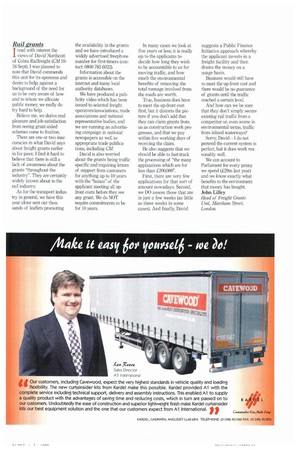Rail grants T read with interest the 1 views of
Page 33

If you've noticed an error in this article please click here to report it so we can fix it.
David Northcott of Cobra Railfreight (CM 1016 Sept). I was pleased to note that David commends this unit for its openness and desire to help; against a background of the need for us to be very aware of how and to whom we allocate public money, we really do try hard to help.
Believe me, we derive real pleasure and job satisfaction from seeing grant-aided schemes come to fruition.
There are one or two inaccuracies in what David says about freight grants earlier in his piece. I find it bard to believe that there is still a lack of awareness about the grants "throughout the industry". They are certainly widely known about in the rail industry.
As for the transport industry in general, we have this year alone sent out thousands of leaflets promoting the availability in the grants and we have introduced a widely advertised freephone number for first-timers (contact 0800 783 6022).
Information about the grants is accessible on the internet and many local authority databases.
We have produced a publicity video which has been issued to selected freight operators/associations, trade associations and national representative bodies, and we are running an advertising campaign in national newspapers as well as appropriate trade publications, including CM.
David is also worried about the grants being traffic specific and requiring letters of support from customers for anything up to 10 years with the "bonus" of the applicant meeting all upfront costs before they see any grant. We do NOT require commitments to be for 10 years. In many cases we look at five years or less; it is really up to the applicants to decide how long they wish to be accountable to us for moving traffic, and how much the environmental benefits of removing the total tonnage involved from the roads are worth.
True, business does have to meet the up-front cost first, but it distorts the picture if you don't add that they can claim grants from us as construction work progresses, and that we pay within five working days of receiving the claim.
He also suggests that we should be able to fast-track the processing of "the many applications which are for less than £200,000".
First, there are very few applications for that sort of amount nowadays. Second, we DO assess those that are in just a few weeks (as little as three weeks in some cases). And finally, David suggests a Public Finance Initiative approach whereby the applicant invests in a freight facility and then draws the money on a usage basis.
Business would still have to meet the up-front cost and there would be no guarantee of grants until the traffic reached a certain level.
And how can we be sure that they don't simply secure existing rail traffic from a competitor or, even worse in environmental terms, traffic from inland waterways?
Sorry David—1 do not pretend the current system is perfect, but it does work reasonably well,
We can account to Parliament for every penny we spend (£29m last year) and we know exactly what benefits to the environment that money has bought. John Liffey
Head of Freight Grants Unit, Marsham Street, London.




























































































































